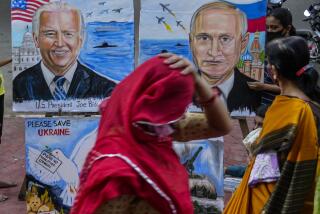Ending an Ominous Silence
- Share via
The leaders of India and Pakistan will meet at a summit this weekend for the first time in 21/2 years. That’s far too long a silence for nuclear neighbors that fought three wars and battled fiercely in the Himalayas two years ago.
Pakistan’s new leader is the man India blames for starting that 11-week conflict in the disputed state of Kashmir. As army chief of staff, Pervez Musharraf was in charge when Pakistani fighters attacked Indians two years ago. Since then he has toppled a civilian prime minister and, last month, had the audacity to name himself president.
Give Indian Prime Minister Atal Behari Vajpayee credit. He crossed the border by bus for a summit in Lahore in February 1999, only to see Pakistanis invade territory claimed by India soon after that meeting. Pakistan said the fighters were guerrillas. That’s extremely doubtful, but even if they were they couldn’t have gotten as far as they did without help from the Pakistani army.
Vajpayee initiated this weekend’s summit in New Delhi and in Agra, not far from the Taj Mahal. It would be unrealistic to expect a major settlement of the disputes between the two countries, which became independent from Britain in 1947. Kashmir will be the main sticking point. Yet there are smaller agreements, confidence-building measures, that might get the two sides to stop seeing each other as the devil.
One could be a bus service connecting the Indian-held and Pakistani-held sides of Kashmir. Even resuming cricket matches between the two countries would be a help. Another step forward would be an agreement not to test missiles without notifying the other side. In the longer term, there could be a gas pipeline from Iran, running across Pakistan to India. All would require substantial cooperation.
Musharraf’s country is an economic basket case. The less spent on defense, the more available to feed Pakistanis, build roads and educate children. India is better off only by comparison. Past decades have seen summits convened at irregular intervals and little follow-up thereafter. Both nations should treat this meeting as the start of regular consultations among political, diplomatic and military officials.
More to Read
Sign up for Essential California
The most important California stories and recommendations in your inbox every morning.
You may occasionally receive promotional content from the Los Angeles Times.













